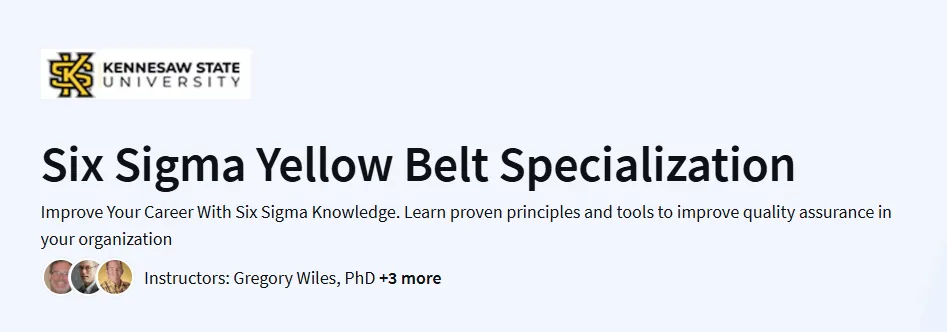What you will learn in Six Sigma Yellow Belt Specialization Course
Gain a foundational understanding of Six Sigma and Lean methodologies to enhance business processes and performance.
Learn to define project goals and customer deliverables using the DMAIC (Define, Measure, Analyze, Improve, Control) framework.
Develop skills in data collection and analysis to identify root causes of process issues.
Explore tools and techniques for process improvement and control to ensure quality assurance.
Apply Six Sigma principles through hands-on projects and real-world scenarios.
Program Overview
Six Sigma Fundamentals
⏱️ 4 weeks
- Introduction to Six Sigma and its significance in various industries.
- Overview of the DMAIC methodology and its application in process improvement.
- Roles and responsibilities of Six Sigma team members.
Six Sigma Tools for Define and Measure
⏱️ 4 weeks
- Techniques for defining project scopes and identifying customer requirements.
- Methods for measuring current process performance and establishing baseline metrics.
- Data collection strategies and tools for effective analysis.
Six Sigma Tools for Analyze
⏱️ 4 weeks
- Approaches for identifying root causes of process inefficiencies.
- Utilization of statistical analysis to interpret data and draw conclusions.
- Application of hypothesis testing in process analysis.
Six Sigma Tools for Improve and Control
⏱️ 4 weeks
- Strategies for implementing process improvements and solutions.
- Control mechanisms to sustain improvements and ensure consistent performance.
- Development of control plans and documentation for ongoing quality management.
Get certificate
Job Outlook
Six Sigma methodologies are highly regarded across various industries, including manufacturing, healthcare, finance, and IT, for their effectiveness in process improvement and quality management.
Professionals with Six Sigma certifications often pursue roles such as Process Improvement Analyst, Quality Assurance Specialist, and Operations Manager.
Employers value candidates with Six Sigma training for their ability to enhance efficiency, reduce waste, and improve customer satisfaction.
Acquiring a Yellow Belt certification can serve as a stepping stone toward advanced Six Sigma certifications, potentially leading to higher-level positions and increased salary prospects.
Specification: Six Sigma Yellow Belt Specialization
|
FAQs
- The specialization is designed for beginners, requiring no prior experience in process improvement or Six Sigma.
- It provides foundational knowledge in Six Sigma principles and Lean methodologies.
- The program introduces key tools and techniques for process improvement and quality assurance.
- Learners will explore the basics of the DMAIC (Define, Measure, Analyze, Improve, Control) framework.
- The specialization emphasizes practical skills applicable to real-world scenarios.
- Six Sigma Fundamentals: Introduction to Six Sigma and its significance in various industries.
- Six Sigma Tools for Define and Measure: Techniques for defining project scopes and measuring process performance.
- Six Sigma Tools for Analyze: Approaches for identifying root causes of process inefficiencies.
- Six Sigma Tools for Improve and Control: Strategies for implementing process improvements and sustaining them.
- The specialization consists of 4 courses, each taking approximately 4 weeks to complete.
- The total estimated time to complete the specialization is 16 weeks.
- The courses are self-paced, allowing learners to start and finish at their convenience.
- Access to course materials is available for a specified period after enrollment.
- Learners can accelerate or slow down their learning based on personal schedules.
- Completing the specialization prepares you for roles such as Process Improvement Analyst, Quality Assurance Specialist, and Operations Manager.
- The program provides foundational knowledge in Six Sigma principles and Lean methodologies.
- The specialization emphasizes practical skills applicable to real-world scenarios.
- Employers value candidates with Six Sigma training for their ability to enhance efficiency and reduce waste.
- Acquiring a Yellow Belt certification can serve as a stepping stone toward advanced Six Sigma certifications.
- The specialization includes hands-on exercises that simulate real-world process improvement tasks.
- Projects cover areas such as defining project scopes, measuring process performance, and implementing process improvements.
- Learners will apply Six Sigma tools and techniques to solve business problems for a fictional company.
- The program emphasizes practical skills applicable to real-world scenarios.





